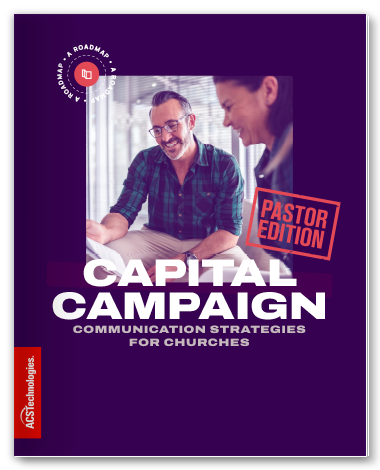If your church is considering a capital campaign, there are LOTS to plan and consider. With project costs and donor asks to wrestle with, it’s too easy to set aside your campaign’s communications strategy…or not have one at all.
In this series, we’ll outline a roadmap for a simple but effective strategy for your capital campaign’s communications. Over the next weeks, we’ll unpack how to develop a case statement, build your campaign’s branding, what media platforms to consider and how to best get the message out to your members and supporters.
We often see churches miss significant opportunities to communicate the spirit of their unique campaign project, the good it will do, and the way it advances the kingdom simply because they haven’t put the right plans in place. A well-communicated campaign not only raises more financial support, it grows excitement, advocacy, and interest among your members and community.
We’ve talked in prior blogs and video posts about the importance of campaign planning. As you use the planning months to develop your project scope and costs and assess your donor capacity, your communications planning can begin to take shape.
Take these steps in the campaign planning and silent phases:
- Keep careful notes as you identify how this project ties to your church’s mission. What specifically will this project do for your church, its ministry, and those you serve?
- Who are the audiences served by this project? How will they be affected?
- Who are the various target audiences for your campaign? What are their communication needs? How do they like and expect to receive information from your church or pastor?
- As you interview key stakeholders and potential donors, note what drives their passion for this particular project. Who in your member and prospect base has a great testimony about the ministry enhanced by this project? What are they saying about the future of this ministry and your church?
- Stay attuned for course corrections or information your members need about the project. If, for example, many members struggle to understand the project’s phases or financing, make notes of what clarifications may be needed in your materials when you launch publicly.
- As you thank your lead donors for their commitments in the silent phase, ask what they would say to others who haven’t yet pledged their support. What motivated them to be a donor, and what do they think others need to hear?
Your campaign planning and silent phases offer you opportunities to glean the kind of information your general members will need and want to consider their own pledges of support.
Where to start
Campaign communications planning begins with a clear message of your project’s goals and ties to your mission. Your understanding of your audiences and their needs will guide your strategies. Set aside time throughout your planning and silent phases to sort through the information you’ll need for future communications pieces.
In the next weeks of this series, we’ll outline the steps to developing your campaign’s case statement and campaign materials, and branding.
Capital Campaign Communications Strategies for Churches
One of the most critical – but most overlooked – parts of planning a campaign is your communications plan. Launching a campaign without a strategy in place for communications can create confusion at best and often leads to poor results.
Considering a Capital Campaign?
Capital campaigns are a daunting task, even under the best circumstances. If you’ve been considering — or putting off — a capital campaign to raise funds to grow your church or expand your ministry, the solution is here.
ACS Technologies® teamed up with Non-Profit DNA to offer an extensive and comprehensive consulting service. We want to help make your upcoming capital campaign a success. Through this partnership, you’ll have access to highly skilled, knowledgeable fundraising experts who will help with your campaign — every step of the way.
Visit Capital Campaigns on our website to request your consultation today!
Tim has over 30 years of experience in Church, Non-Profit Administration, Management, and Fund Development. Serving as an Executive Pastor and Chief Development Officer in growing Churches and Non-Profit Organizations. He has provided a wide range of expertise and resources. Tim serves as the Founder and CEO of Non-Profit DNA. A boutique firm committed to helping nonprofits and churches. By building their capacity through fundraising, leadership, team building, staff recruiting, and coaching.





